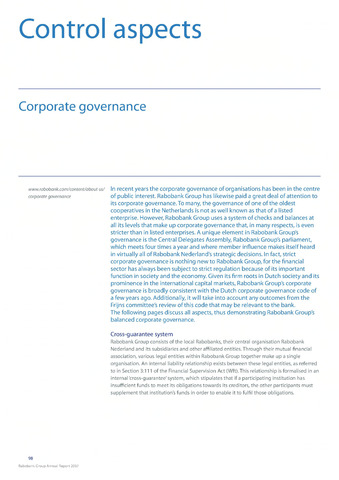Control aspects
Corporate governance
www.rabobank.com/content/aboutus/ In recent years the corporate governance of organisations has been in the centre
corporate governance of public interest. Rabobank Group has likewise paid a great deal of attention to
its corporate governance. To many, the governance of one of the oldest
cooperatives in the Netherlands is not as well known as that of a listed
enterprise. However, Rabobank Group uses a system of checks and balances at
all its levels that make up corporate governance that, in many respects, is even
stricter than in listed enterprises. A unique element in Rabobank Group's
governance is the Central Delegates Assembly, Rabobank Group's parliament,
which meets four times a year and where member influence makes itself heard
in virtually all of Rabobank Nederland's strategic decisions. In fact, strict
corporate governance is nothing new to Rabobank Group, for the financial
sector has always been subject to strict regulation because of its important
function in society and the economy. Given its firm roots in Dutch society and its
prominence in the international capital markets, Rabobank Group's corporate
governance is broadly consistent with the Dutch corporate governance code of
a few years ago. Additionally, it will take into account any outcomes from the
Frijns committee's review of this code that may be relevant to the bank.
The following pages discuss all aspects, thus demonstrating Rabobank Group's
balanced corporate governance.
Cross-guarantee system
Rabobank Group consists of the local Rabobanks, their central organisation Rabobank
Nederland and its subsidiaries and other affiliated entities. Through their mutual financial
association, various legal entities within Rabobank Group together make up a single
organisation. An internal liability relationship exists between these legal entities, as referred
to in Section 3:111 of the Financial Supervision Act (Wft). This relationship is formalised in an
internal 'cross-guarantee' system, which stipulates that if a participating institution has
insufficient funds to meet its obligations towards its creditors, the other participants must
supplement that institution's funds in order to enable it to fulfil those obligations.
98
Rabobank Group Annual Report 2007

